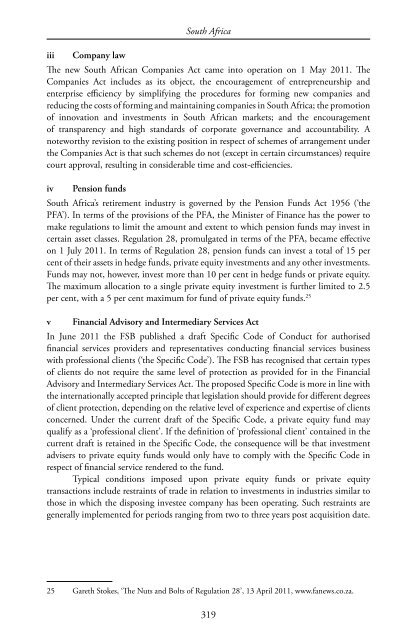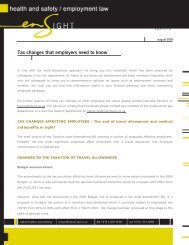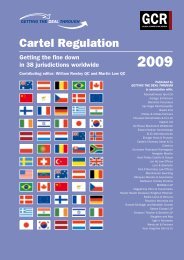The Private Equity Review - ENS
The Private Equity Review - ENS
The Private Equity Review - ENS
- No tags were found...
You also want an ePaper? Increase the reach of your titles
YUMPU automatically turns print PDFs into web optimized ePapers that Google loves.
iiiCompany lawSouth Africa<strong>The</strong> new South African Companies Act came into operation on 1 May 2011. <strong>The</strong>Companies Act includes as its object, the encouragement of entrepreneurship andenterprise efficiency by simplifying the procedures for forming new companies andreducing the costs of forming and maintaining companies in South Africa; the promotionof innovation and investments in South African markets; and the encouragementof transparency and high standards of corporate governance and accountability. Anoteworthy revision to the existing position in respect of schemes of arrangement underthe Companies Act is that such schemes do not (except in certain circumstances) requirecourt approval, resulting in considerable time and cost-efficiencies.iv Pension fundsSouth Africa’s retirement industry is governed by the Pension Funds Act 1956 (‘thePFA’). In terms of the provisions of the PFA, the Minister of Finance has the power tomake regulations to limit the amount and extent to which pension funds may invest incertain asset classes. Regulation 28, promulgated in terms of the PFA, became effectiveon 1 July 2011. In terms of Regulation 28, pension funds can invest a total of 15 percent of their assets in hedge funds, private equity investments and any other investments.Funds may not, however, invest more than 10 per cent in hedge funds or private equity.<strong>The</strong> maximum allocation to a single private equity investment is further limited to 2.5per cent, with a 5 per cent maximum for fund of private equity funds. 25v Financial Advisory and Intermediary Services ActIn June 2011 the FSB published a draft Specific Code of Conduct for authorisedfinancial services providers and representatives conducting financial services businesswith professional clients (‘the Specific Code’). <strong>The</strong> FSB has recognised that certain typesof clients do not require the same level of protection as provided for in the FinancialAdvisory and Intermediary Services Act. <strong>The</strong> proposed Specific Code is more in line withthe internationally accepted principle that legislation should provide for different degreesof client protection, depending on the relative level of experience and expertise of clientsconcerned. Under the current draft of the Specific Code, a private equity fund mayqualify as a ‘professional client’. If the definition of ‘professional client’ contained in thecurrent draft is retained in the Specific Code, the consequence will be that investmentadvisers to private equity funds would only have to comply with the Specific Code inrespect of financial service rendered to the fund.Typical conditions imposed upon private equity funds or private equitytransactions include restraints of trade in relation to investments in industries similar tothose in which the disposing investee company has been operating. Such restraints aregenerally implemented for periods ranging from two to three years post acquisition date.25 Gareth Stokes, ‘<strong>The</strong> Nuts and Bolts of Regulation 28’, 13 April 2011, www.fanews.co.za.319





